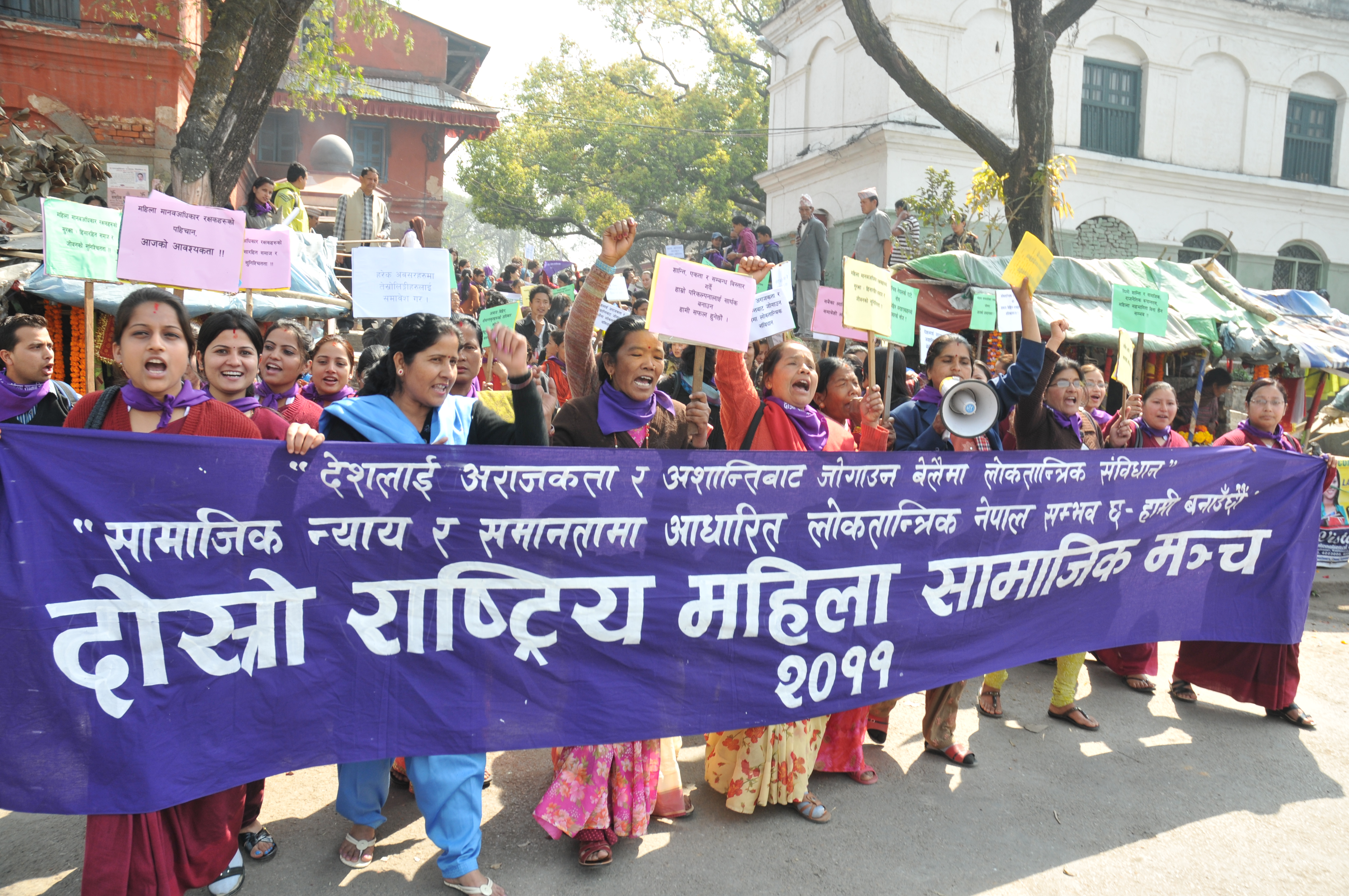
15-16th March, 2011
Initially thought of in Brazil in 2001, where marginalized community took the leadership and make this a venue to express their voices, Social forum has spread to India, Pakistan, Burma, Venezuela, Kenya, Sri Lanka, etc . In Nepal, the first National Women's Social Forum was held in 2009, followed by the Regional Women's Social Forum which took place in all the five development regions of the country. The Social Forum has historically been a space to question the global development apparatus as well as the current neoliberal polices and market-oriented policies. In Nepal, the main theme of the Social Forum is "A democratic Nepal based on Social Justice and Equality is Possible – We will build it".
Overall, the Social Forum demands for democratic principles and transformation of prevalent structures, recognizing the heterogeneity and the inter-linkages of women's issues in Nepal.
It is aimed at fortifying the voices of the marginalized and oppressed by empowering them to claim their rights. Its main objectives are to create positive pressure to make all the stakeholders accountable to end all kind of violence and discrimination against women.
The event this year took place in the crucial moment of the current political deadlock and the consequent delayed promulgation of the constitution. With only 73 days remaining for the deadline given for the promulgation, the event is meant to provide a ground for discussion and to collect voices for pressurizing the constituent assembly, the government and policy makers for a timely, democratic and gender-sensitive constitution.
Objectives
The participants have the opportunity to discuss and to question the development apparatus of the country and the shortcomings of the existent neo-liberal policies from a gender sensitive standpoint.
The forum allows for inter-movements dialogues. Heterogeneous movements get to have a better understanding of each other and share their different experiences.
It also provides a platform for different generations of feminists to come together to confront each other's views and integrate their different perspectives.
Outcome
Over 1000 people from all over Nepal gathered on the 15th of March for the rally and the following events. The rally started at Bhadrakali and went around Tundikhel to converge in Bhirukuti Mandap where the following events were to be held. There was representation from marginalized communities such as Dalits, LGBTIs, differently able, women from the Muslim community, indigenous communities, Madhesis, women living with HIV/Aids, different ethnic groups alongside women from the housing rights movement and from the land rights movement. Migrant workers and women working in informal sector were also a part of the activities.
About 22 workshops took place, covering topics such as: Social and Cultural Rights, Right to food, Human Trafficking, Land Rights, Sexual Rights, Women in Politics and in the Decision Making Process, Dalit Women's Issues, the History and the Future of the Feminist Movement in Nepal, Women's Experience and Contribution to the Peace Building Process, Migrant Workers Eights, Sexual Violence and Access to Justice for the Victims, Protection of Women Human Rights Defenders.
The thematic workshops were aimed at finding common ground to make women's voice clearer and stronger. Based on the common standpoints elaborated during the workshops by the different movements, a Declaration has been drafted and it is to be disseminated.
Many organizations disseminated information through IEC stalls. A Cycle City 2020 campaign working to promote Kathmandu as cycle friendly city also had a stall through which they promoted their various go green campaigns. In addition, a cultural programme presented by groups representing different part of the country was held, including performances by the Kritika campaign, who also released their new album, "Beg 3" on the same occasion.
Also, a photo exhibition on the struggle of Nepali women for democracy has been displayed in different locations of the venue. Thanks to the collaboration of the Docskool two movies engaging with the topic of discrimination directed by Mr. Shyam Benegal have been showed at the end of the daily programme: "Ankur"(March 15), and "Mandi" (March 16).
A plenary workshop was conducted at the conclusion of the event and brought forth the conclusions of the various thematic workshops and highlighted on the main points to be included in the Declaration.
The organizers of the event were: WOREC Nepal, National Alliance of Women Human Rights Defenders, CWIN, CWISH, Shakti Samuha, Didi Bahini, COCAP, Youth Action Nepal, Jaagaran Nepal, Pourakhi, PNCC, Action Aid, Shanti Malika, Nepal Mahila Ekta Samaj, FIAN, Mahila Prjanan Adhikar Karyalaya, CAED Nepal, Mahila Adhikar Manch Prerana, Blue Diamond Society, Mahila Surakshya Dabab Samuha, feminist (dalit ( FEDO) organization), Nepal Disabled Women's Association (NDWA), Nepal Dalit Mahila Utthan Sangh, Women's Forum for Women Nepal, Shakti Samuha, Working Women's Journalists, Shanti Milan Samaj, CSRC, Bhumi Adhikar Manch, AATWIN, WAPDCA, Mahila Kanun tatha Bikas Manch, Himwanti, Homenet, Kritika Campaign, Lalitpur Nursing College, Rashtriya Dalit Network (RDN), Nawatara Kishori Sanjal.
On the 17th of March, the Social Forum will converge with the Movement participating in the land rights forum taking place in Kathmandu involving people from 40 districts demanding for land rights, rights for women in agriculture and for a scientific land reform system. A declaration will be read during the Social forum as a part of expressing solidarity and support for this movement.